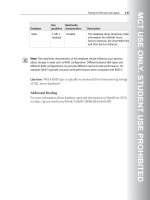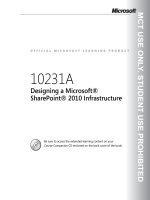Designing a Microsoft SharePoint 2010 Infrastructure Vol 2 part 20 ppsx
Bạn đang xem bản rút gọn của tài liệu. Xem và tải ngay bản đầy đủ của tài liệu tại đây (734.4 KB, 10 trang )
MCT USE ONLY. STUDENT USE PROHIBITED
Developing a Plan for Governance 12-51
Lab: Developing a Plan for Governance
Exercise 1: Creating a Governance Plan
Scenario
You need to create a governance plan for the Contoso, Ltd SharePoint Server 2010
implementation. Additional information that your team needs is detailed in the
supplied documents. You will use these documents to produce a planning
worksheet to help create your governance plan.
The main tasks for this exercise are as follows:
1. Read the supporting information.
2. Complete the SharePoint 2010 Governance worksheet.
f Task 1: Read the supporting information
1. Read the lab scenario.
MCT USE ONLY. STUDENT USE PROHIBITED
12-52 Designing a Microsoft® SharePoint® 2010 Infrastructure
2. Log on to 10231A-NYC-DC1-12 as CONTOSO\Ed with the password
Pa$$w0rd.
3. In the E:\Labfiles\Lab12\Starter folder, read the information in the Contoso
Provisioning and Customization Requirements.docx file.
f Task 2: Complete the SharePoint 2010 Governance worksheet
• In the E:\Labfiles\Lab12\Starter folder, complete the worksheet in the
SharePoint 2010 Governance Worksheet.xlsx file.
Exercise 2: Implementing the Governance Plan
Scenario
You will now implement some of the settings in the planning worksheet for your
governance plan for the team.contoso.com site. You will do this by using the
information outlined in the Contoso Provisioning and Customization
Requirements document and the SharePoint 2010 Governance worksheet.
The main tasks for this exercise are as follows:
1. Enable self-service site creation on the SharePoint Team Web application.
2. Disable SharePoint Designer for the SharePoint Team Web application.
3. Start the Microsoft SharePoint Foundation Sandboxed Code service.
4. Configure load balancing for sandboxed solutions in the farm.
5. Configure the site storage individual quota limit for the SharePoint Team site.
6. Verify that users can upload sandboxed solutions in team.contoso.com.
f Task 1: Enable self-service site creation on the SharePoint Team Web
application
• For the SharePoint Team Web application, enable the Self-Service Site Creation
setting.
MCT USE ONLY. STUDENT USE PROHIBITED
Developing a Plan for Governance 12-53
f Task 2: Disable SharePoint Designer for the SharePoint Team Web
application
• For the SharePoint Team Web application, disable SharePoint Designer.
f Task 3: Start the Microsoft SharePoint Foundation Sandboxed Code
service
• Start the Microsoft SharePoint Foundation Sandboxed Code service on the
server.
f Task 4: Configure load balancing for sandboxed solutions in the farm
• Verify that when users want to run sandboxed solutions in the farm, they are
routed by using solution affinity load balancing.
f Task 5: Configure the site storage individual quota limit for the
SharePoint Team site
• Configure the site storage individual quota limit to be 1 GB.
f Task 6: Verify that users can upload sandboxed solutions in
team.contoso.com
• In team.contoso.com, verify that users can upload sandboxed solutions.
MCT USE ONLY. STUDENT USE PROHIBITED
12-54 Designing a Microsoft® SharePoint® 2010 Infrastructure
Module Review and Takeaways
Review Questions
1. What are the five key elements of a SharePoint Server 2010 governance plan?
2. Whose role is it to perform the day-to-day management tasks required to
ensure that the content on the site or page is accurate, relevant, and up to
date?
3. What is a simple way of communicating the details of your governance plan to
everyone in the organization?
4. Which IT service feature enables you to stop users adding more content to the
site after the site collection reaches a specific threshold?
MCT USE ONLY. STUDENT USE PROHIBITED
Developing a Plan for Governance 12-55
Best Practices Related to Developing a Governance Plan
Supplement or modify the following best practices for your own work situations:
• Make sure that you have a governance committee that has a strong supporter
in the role of executive sponsor.
• Keep your governance model as simple as possible while still maintaining its
strength.
• Ensure that you do not make the solution more complex than necessary by
overdesigning it. SharePoint may have a great feature, but that does not
necessarily mean that you need to deploy it, or at least not immediately.
• Ensure that all users with design or Full Control privileges have internalized
your design guiding principles and that content contributors understand your
guiding principles for creating content.
• An effective governance plan should not need to restrict every move; it should
provide guidance to users to ensure that the implementation of SharePoint
Server 2010 remains effective and dynamic over time.
MCT USE ONLY. STUDENT USE PROHIBITED
MCT USE ONLY. STUDENT USE PROHIBITED
Designing a Maintenance and Monitoring Plan 13-1
Module 13
Designing a Maintenance and Monitoring Plan
Contents:
Lesson 1: Principles of Maintenance and Monitoring 13-3
Lesson 2: Creating a Maintenance Plan for SharePoint 2010 13-11
Lesson 3: Creating a Monitoring Plan for SharePoint 2010 13-23
Lesson 4: Considerations for the Maintenance and Monitoring of
Associated Technologies 13-35
Lab: Designing a Maintenance and Monitoring Plan 13-46
MCT USE ONLY. STUDENT USE PROHIBITED
13-2 Designing a Microsoft® SharePoint® 2010 Infrastructure
Module Overview
You must ensure that your Microsoft® SharePoint® 2010 infrastructure can operate
at maximum efficiency, given the constraints of your particular environment. To do
this, you require a maintenance and monitoring plan. This plan will help you to
ensure that the most vulnerable aspects of the infrastructure are in the best
possible state.
Objectives
After completing this module, you will be able to:
• Describe the essential principles of a maintenance and monitoring plan.
• Create a maintenance plan for SharePoint 2010.
• Create a monitoring plan for SharePoint 2010.
• Describe the considerations for developing a maintenance and monitoring
plan that incorporates technologies that support SharePoint 2010.
MCT USE ONLY. STUDENT USE PROHIBITED
Designing a Maintenance and Monitoring Plan 13-3
Lesson 1
Principles of Maintenance and Monitoring
When you develop a maintenance and monitoring plan, you should be mindful of
the end requirements. You must understand the goals of maintenance and
monitoring in your organization. This will help you to plan for all of the necessary
aspects of maintaining and monitoring your SharePoint 2010 infrastructure. It will
also help you to meet service-level agreements (SLAs) and manage the change
process.
Objectives
After completing this lesson, you will be able to:
• Describe the goals of maintenance and monitoring planning.
• Explain how to meet the requirements of quality assurance (QA) planning.
• Describe how to incorporate change management policies into the
maintenance and monitoring plan.
MCT USE ONLY. STUDENT USE PROHIBITED
13-4 Designing a Microsoft® SharePoint® 2010 Infrastructure
Goals of Planning for Maintenance and Monitoring
Key Points
To meet the business requirements of your organization, you should design and
document a maintenance and monitoring plan. The goal of this plan is to enable
you to keep SharePoint 2010 running at optimum performance and perform
proactive maintenance tasks.
Service-Level Agreements
Many organizations issue one or more service standards that specify required
uptime, performance levels, and recovery times. These service standards or SLAs
may exist between departments in the organization to detail the expectations that
one department has of another. Organizations also often use SLAs to detail a
required level of service between the organization and its suppliers, customers, and
partners.
A well-designed maintenance and monitoring plan enables you to meet the SLAs
that affect the SharePoint 2010 environment.









